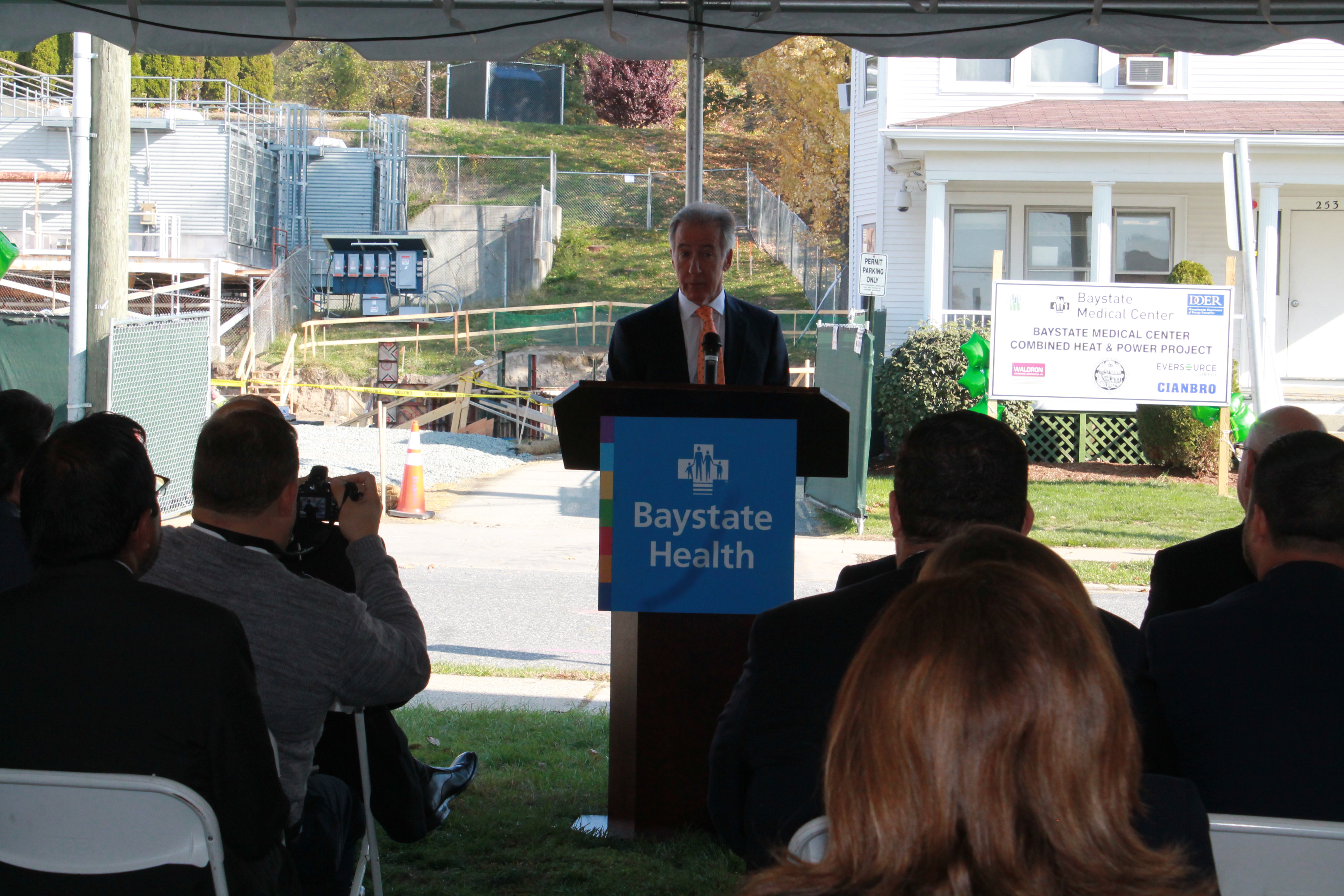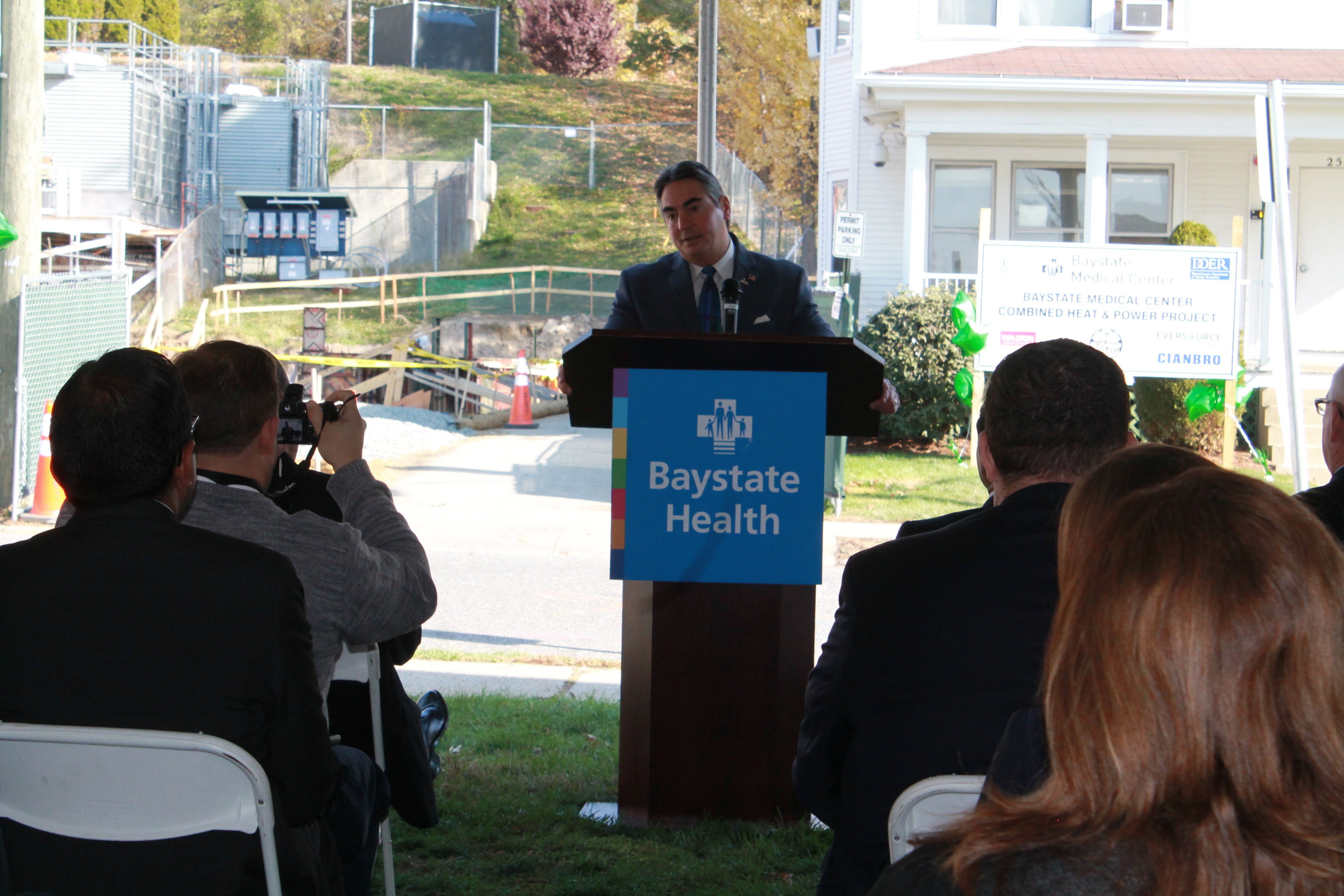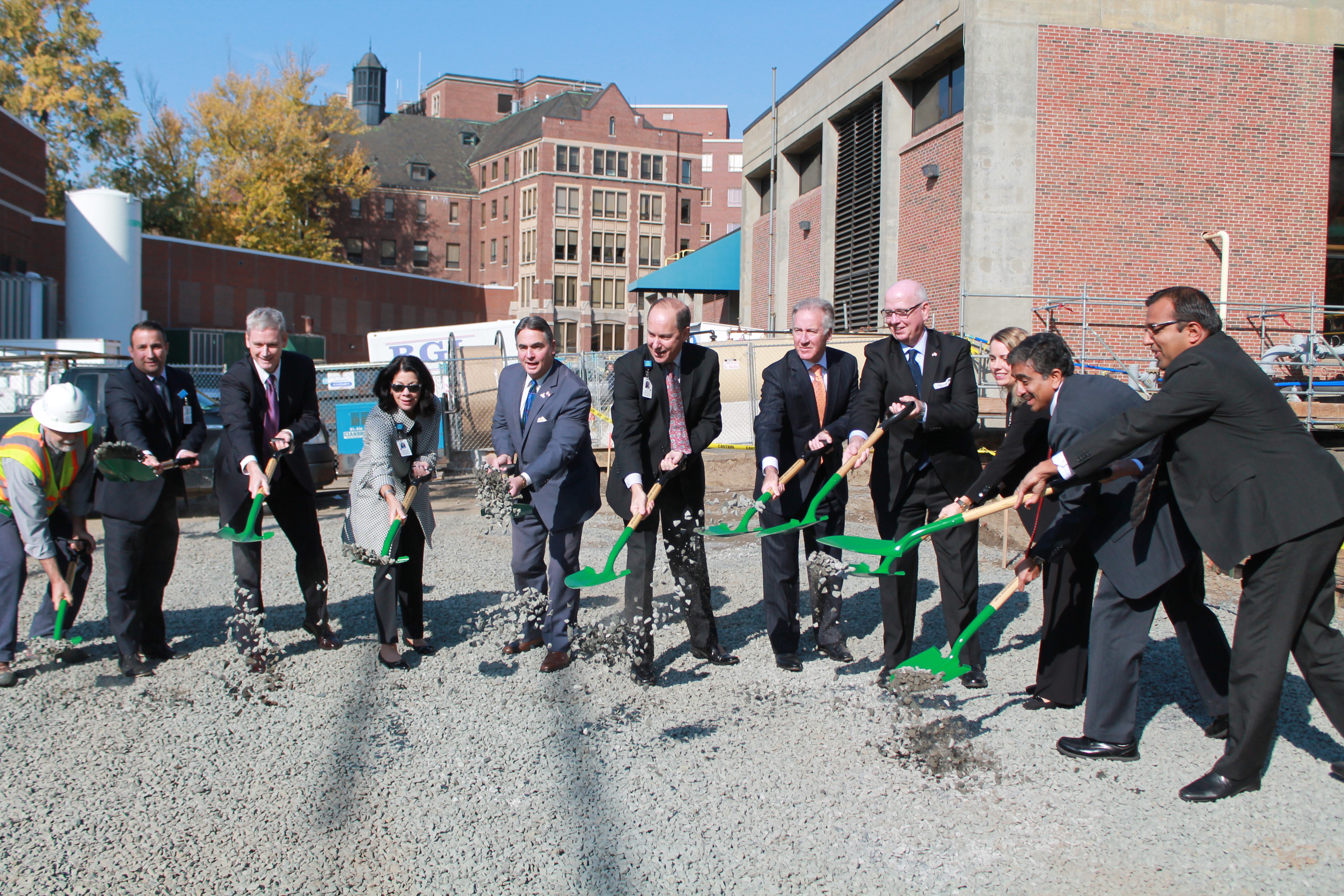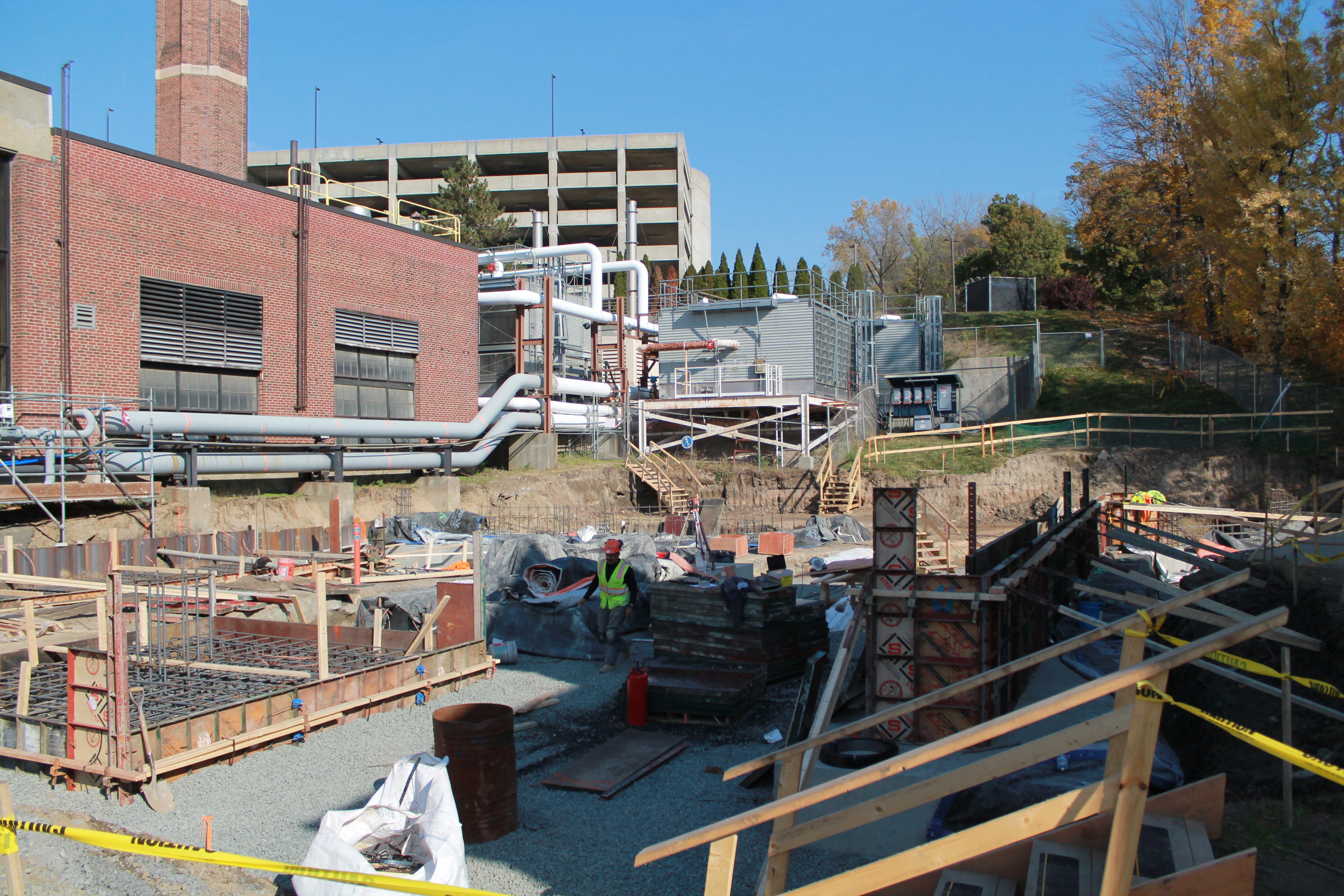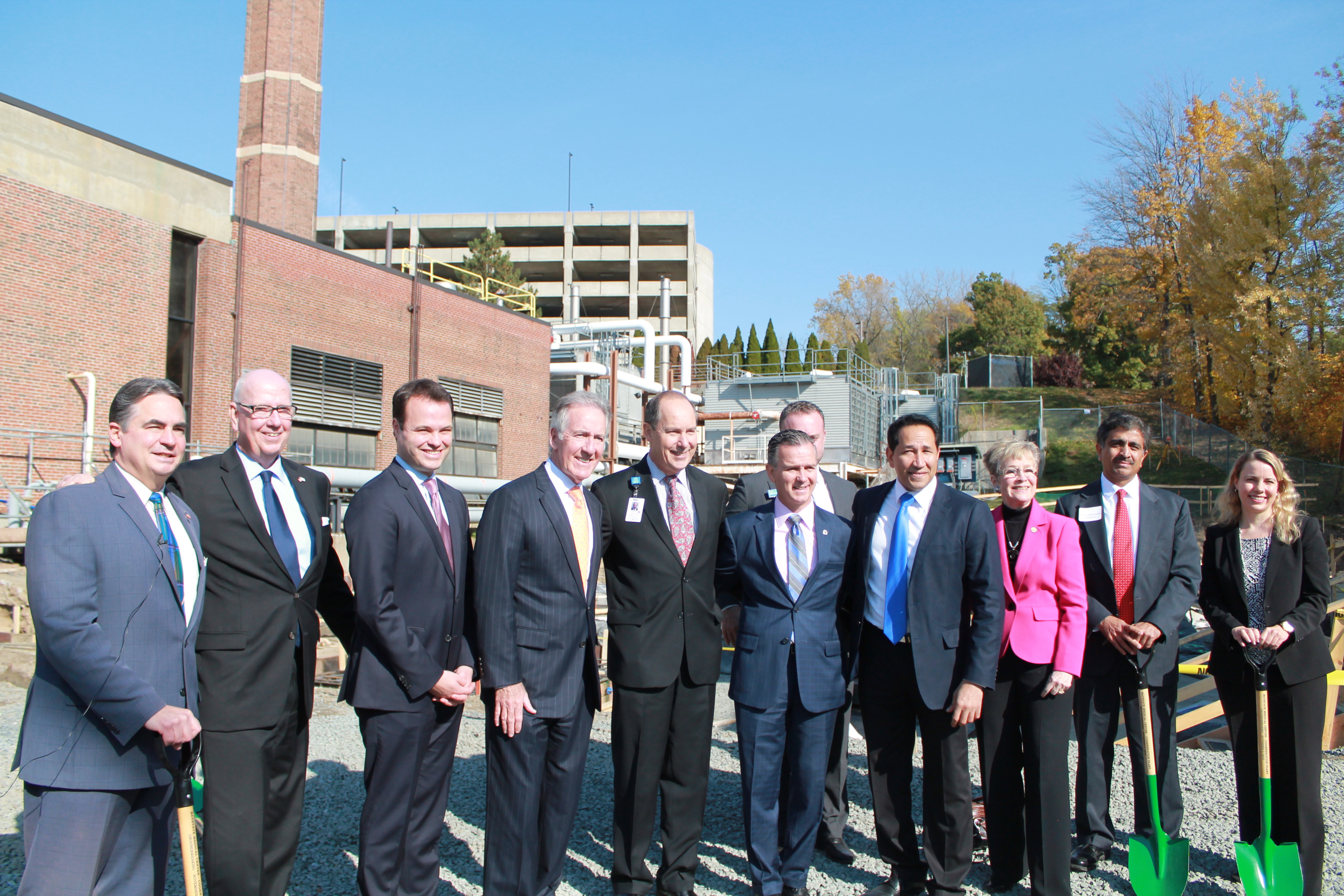Thursday, November 3, 2016
Yesterday, Baystate Health and public officials broke ground on a $27 million combined heat and power plant that will provide non-grid energy sources to critical facilities in the event of power loss during a disaster. The project is a collaboration between the U.S. Department of Housing & Urban Development (HUD), the City of Springfield, the Massachusetts Department of Energy Resources (DOER), Eversource Energy, and Baystate Health.
The new state-of-the-art power plant is part of HUD’s National Disaster Resilience Competition, a program which awarded the City of Springfield over $17 million to facilitate disaster resiliency earlier this year.
“HUD’s National Disaster Resiliency Competition was one of the toughest competitions in HUD’s history. The funding that Springfield received, and the other sources of capital that are being leveraged as part of the grant is working to make Springfield stronger, more resilient and better prepared for future natural disasters,” said HUD New England Regional Administrator Jim Reed.
“The National Disaster Resilience Competition exemplifies how government can work hand-in-hand with the philanthropic and private sectors to create lasting partnerships that will allow us to together face the challenges of tomorrow.”
The Massachusetts Department of Energy Resources provided a $2.8 million grant and Eversource Energy invested $5 million to facilitate the project. The cogeneration power plant will replace Baystate Medical Center’s 80-year-old facility and allow the hospital to use a 4.6 megawatt turbine to produce 80% of its own power, bringing much needed relief to the overall energy grid.
"Lives depend on hospitals operating every hour of every day, in every kind of weather," said Tilak Subrahmanian, Vice President of Energy Efficiency at Eversource. "As we continue to make the electric grid stronger and more resilient, we're also seeing more severe storms affecting our region. Baystate Health is making it their mission to be ready if the power goes out, with this new co-generation system allowing them to continue seamlessly caring for patients regardless of the weather."
The byproduct of the combustion associated with the spinning natural gas engine is steam, which will be used to heat the hospital. The steam can also be converted into coolant to be used for air conditioning during the summer months.
“Instead of burning coal or burning oil exclusively to produce electricity, we are burning natural gas to produce electricity and steam so it’s a two-for-one benefit,” said Sean Gouvin, Director of Facilities Planning and Engineering at Baystate Health. “The combined heat and power plant is the crown jewel of any sustainability master plan. We are committed conserving resources and protecting our environment in the most efficient way possible.”
Once completed, the new facility will allow for Baystate’s current smokestack and associated facility to be retired, being utilized only when the new plant is undergoing maintenance. The cogeneration plant will increase Baystate’s energy efficiency by roughly 25%, while reducing greenhouse gases by the equivalent of 4,000 vehicles per year.
“The Baker-Polito Administration is committed to creating a clean, affordable and resilient energy future for the Commonwealth that reduces energy costs, usage and emissions,” said Department of Energy Resources Commissioner Judith Judson. “The resiliency offered by Baystate Medical’s cogeneration plant will allow medical professionals to focus on caring for patients, instead of where their power is coming from.”
In accordance with HUD’s continued efforts to ensure that cities and towns are prepared to handle disaster situations, similar to the June 1st, 2011 tornado in Springfield, this project will allow Baystate to continue to serve as a backbone for the entire region during an emergency. Baystate can currently maintain power during an outage for 96 hours. With the new plant, electricity will continue to flow through the hospital through an outage of 30 days or more.
“The City of Springfield and corporate partners like Baystate Health continue to take a proactive approach when it comes to emergency preparedness. Today’s ground breaking on a combined heat and power plant is a good example of that strategy. Our community demonstrated extraordinary resilience following the catastrophic storms of June 2011. It makes perfect sense to put the necessary safeguards in place to protect us from a future natural disaster. Only 13 grants were awarded nationwide by HUD during this round of funding, so that speaks volumes about the master plan that Springfield has in place. This $27 million project is a smart investment in our future,” said Congressman Richard E. Neal.
“We are very grateful and thankful to the U.S. Department of Housing and Urban Development for this major funding,” said Springfield Mayor Domenic J. Sarno. “More importantly, their recognition on how the City of Springfield, not only handled the devastating 2011 tornado, but also how we’ve rebuilt and continue to strive to be even better prepared. Being even better prepared for a catastrophic event is a key statement here, especially in partnering with Baystate Medical Center, the only Level 1 Trauma hospital in Western Massachusetts. We are proud to have a top, well respected – not only in Massachusetts, but in the country too – medical facility such as BMC.”
The project will save Baystate Health an estimated $2.7 million in energy costs annually.
“As the only level one trauma center and the primary medical provider for the residents of western Massachusetts, we know that our doors must always stay open so that lifesaving care remains uninterrupted during the most adverse moments,” said Dr. Mark A. Keroack, president and CEO of Baystate Health. “I am very grateful for the support of our partners in this project and look forward to continuing to work to make Baystate Health a leader throughout New England in energy efficiency and sustainability.”
The cogeneration power plant will be built by Waldron Engineering and Construction and Cianbro Corporation. It is expected to be completed by December 2017.

